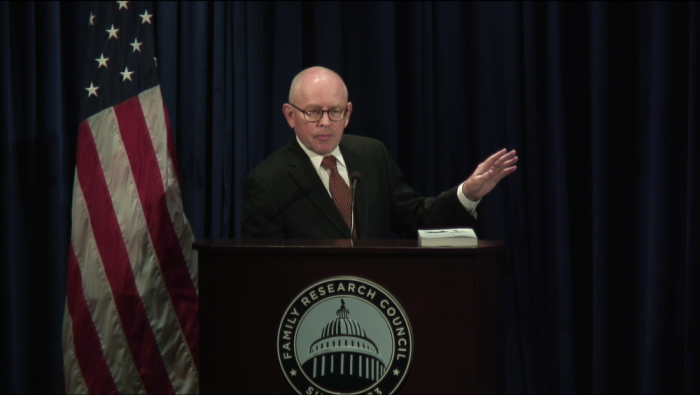Wayne Grudem: Trump's Border Wall 'Morally Good' Because Bible Cities Had Walls

Reformed theologian Wayne Grudem is weighing in on public policy, arguing that it is a "morally good action" to build a wall on the southern border, a move he maintains is consistent with biblical ethics.
In an essay on Townhall Monday, the renowned author and theology professor at Phoenix Seminary said the Bible supports the idea for several reasons, one of them being that walls provide security and peace.
"In the world of the Old Testament, people built walls around cities to protect themselves from thieves, murderers, and other criminals, and from foreign invaders who would seek to destroy the city. People could still enter the city, but they had to do so by the gate, so that city officials would have some control over who was coming in and going out. Today's debate is about a larger area – a national border, not a city – but the principles are the same," Grudem explained.
He added that Psalms 122, 147, and 51, all of which contain references to peace and security within walls or borders, further bolsters this notion. And after King David, Solomon completed and strengthened the wall around Jerusalem, he said.
Yet when the Israelites turned away from God, the Babylonians broke down the walls, which indicated God's judgement against them and "as long as the wall around Jerusalem was broken down, it was a mark of shame and derision," the theologian wrote, referencing Nehemiah 1:3.
"The pathetic shame of a city without walls is also evident in this proverb: 'A man without self-control is like a city broken into and left without walls' (Proverbs 25:28). The implication is that such a man and such a city are both headed for destruction."
In addition, the Jews rebuilt the wall around Jerusalem when they returned from Babylonian captivity, and in Revelation 21 the Apostle John saw a wall surrounding the New Jerusalem in a vision, he said.
"Whether this is literal or simply part of a symbolic prophetic vision (I don't know), it is clear that the wall protects the peace and security of those who are within," he said.
Grudem then addressed several objections, namely, that the United States ought to be more welcoming, Scripture admonishes us to care for the sojourner, the immigrants are decent and are pursuing a better life, and that "walls don't work." The Phoenix Seminary professor stressed that while it is important to treat people with kindness, some limits are necessary, people should come legally, and walls of various kinds are effective and prudent.
"But it is no kindness to [immigrants] if the lack of a wall tempts them to risk death by walking across miles of parched desert, at the mercy of violent gangs, and then come into the US without legal documentation, only to live here as a permanent legal underclass, easily exploited, living in constant fear of discovery. In addition, it diminishes respect for the law and destabilizes the nation when millions of people exist in the shadows, living outside the legal recordkeeping functions of the nation," Grudem said.
"Why should airports be any different from other border entry points? Yes, we are a nation of immigrants, and we should eagerly welcome numerous immigrants into the US every year, but they must come in legally, through the gates in the wall, not illegally and dangerously across an open desert," he concluded.
Radio host and author Eric Metaxas praised the Grudem's words on Twitter Monday calling his article "a sane view of the border wall controversy," and approvingly shared it.
Yet others were not impressed with his application of Scripture on this issue, a topic presently roiling American politics.
"I admire much of Wayne Grudem's work. But this is a crass politicization of biblical interpretation. It helps confirm secular critics' worst caricatures of evangelicalism as politics masquerading as piety," tweeted Thomas Kidd, a professor of history at Baylor University Monday.
The list of modern American political issues that the Bible speaks to directly is short, he said, adding that it reminded him of "the Moral-Majority era voting lists which touted tax cuts and such as the 'biblical' position."
"There are lots of biblical principles that inform a Christian's political views, of course. And I don't question the idea that nations need secure borders and a sane immigration system," Kidd continued.
"But caring for the sojourner is a much more applicable biblical principle in today's immigration politics than 'ancient cities in the Bible had walls, thus the Bible supports Trump's border wall.'"
Brian Baise, a professor of philosophy and apologetics at Boyce College in Kentucky, was less charitable.
"There are genuinely good arguments that can be offered re: a wall, border security, and national sovereignty," he tweeted.
"But hooooo boy this is a train-wreck," he said of Grudem's essay.
Grudem, who is perhaps best known for his textbook Systematic Theology: An Introduction to Biblical Theology, wrote a 2010 book on politics and the Bible, Politics - According to the Bible: A Comprehensive Resource for Understanding Modern Political Issues in Light of Scripture.
Although he originally backed Florida Senator Marco Rubio, in the lead-up to the 2016 presidential election he drew the ire of several Christian thinkers for his lengthy essay arguing why Christians ought to support then candidate Donald Trump as the "morally good choice."




























